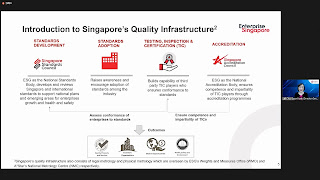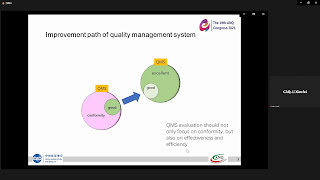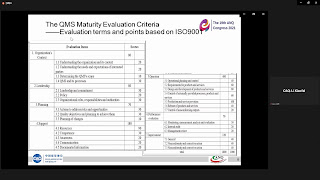Asian Network for Quality (ANQ) Congress 2021
was held by Singapore Quality Institute (SQI) online via Zoom in Singapore from
20th to 21st Oct 2021.
The theme is “Relentless Pursuit of Quality in VUCA World” (where VUCA
stands for Volatile, Uncertain, Complex and Ambiguous).
Before the Congress start, many ANQ friends in
the meeting room and we took a group photo.
Opening Ceremony
Introductory Video of Singapore was played
before the conference. And then Mr. G.E. Tan (Chairman, SQI) gave welcome message.
Prof. Wan Seon Shin (Chairman, ANQ) gave welcome
speech.
Keynote Address
Ms. Choy Sauw Kook (Director-General (Quality
& Excellence) of Enterprise Singapore) was the first keynote speaker and
her topic entitled “Building quality and trust for enterprises products and
services in a VUCA world”.
Firstly, Ms. Choy introduced three key trends in
a VUCA world which were Digitalization, Sustainability and Resilience.
Then she introduced Singapore’s Quality
Infrastructure including standards development, adoption, TIC and
accreditation.
Finally, Ms. Choy briefed how they driving and
supporting QS adoption among enterprises. She concluded that international and
national quality and standards communities help to support companies and
society in adapting to new trends in the VUCA world.
Prof. Noriaki Kano (Honorary Chairperson, ANQ)
was the second keynote speaker and his presentation named “Quality for New
Product Development towards the Second Quarter of 21st Century”.
Firstly, Prof. Kano reviewed quality for new
product development in 20th century “Quality for Cost (QfC) to
Quality of Manufacture (QoM) and then to Quality for Sales (QfS) that realized through
Quality of Product Plan (QoPP) and Quality of Design (QoD) in the 21st
century. Then he briefed Kano Model,
Life Cycle of Quality and Attractive Quality Creation.
After that he explained the relationship among
QoPP, QoD, QoM for customer satisfaction and customer delight.
Lastly, Prof. Kano stated data analysis that led
to defect reducing in new product development with T-type matrix. Three axes of
T-type matrix are Defect-Making (DM), Defect-Could-Have-Been-Found (DCHBF) and
Defect-Finding (DF).
Prof. Goh Thong Ngee (Emeritus Professor,
National University of Singapore) was the third keynote speaker and his topic
was “Is there an antidote to VUCA?” Firstly, Prof. Goh mentioned some scenarios
we faced such as economic, political issues, and unforeseen pandemics, etc.
Then he proposed another VUCA to face Volatile,
Uncertain, Complex and Ambiguous World and they are “Value for Customers”,
“Uniformity in Performance”, “Continuous Improvement” and “Agility in
Operations”.
After that he explained the major support and pre-requisite
for creating “New VUCA” in a VUCA world.
At the end, Prof. Goh quoted Deming statement as
conclusion that constantly implement the “New VUCA”.
Parallel Session 1-12
Dr. KS Chin (Former Chairman, HKSQ) was session
chair for SP-01 (Uncertainty, Change Management, Crisis Management) and Dr.
Wilson Lam from HK presented in this session.
Dr. Wilson Lam’s topic named “Unlocking the
benefits of alternative dispute resolution in enhancement of change management
for construction projects in HKSAR from the project management perspective”.
Firstly Dr. Lam introduced construction sector
in HK and then pointed out the problem that conflicts & disputes resulting
in core challenges on high construction costs, delay and over-expenditure. Then he introduced his research objectives
and methodology.
Finally, he concluded that benefits of the
research included conflict management & negotiation skill enhancement
(dispute avoidance), arbitration approach effectiveness and mediation approach
employed for dispute resolution.
The second speaker was Mrs. Wang Lin (CAQ) and
her topic named “How to Build Brand-driven Operating Strategy under Uncertain
Times – Based on the Research of Chinese Enterprises’ Brand Management Status.
In the beginning, Mrs. Wang briefed some main
problems such as low brand awareness, lack of objective standards to measure
corporate brand value and mechanisms to encourage brand development. Then she
proposed “Total Brand Management” Model.
After that she proposed Sand Pile Model of the
Brand from Quality to Credibility to Responsibility to Technology and then to
Brand. Finally, Mrs. Wang introduced 8
steps to improve the level of brand management.
Then I went to the session SP-09 (Quality
Management) and I was the speaker in this session. Ms. Lang Fei (CAQ) is chair this session.
My presentation title named “Preliminary Study
on Gamification of Extension Innovation Method”. My study aimed to use
gamification mechanism into Extension Innovation method for primary and second
school students.
In the beginning, I quoted Qian Xuesen’s famous
question “Why do our schools always fail to nurture outstanding talents?” as my
motivation to find how and what should do to solve this problem. I proposed to teach student “Extenics” in
funny way so as to enhance their creativity and innovation.
Then I introduced Prof. Cai Wen’s Extenics which
is original Chinese developed innovation method and is also one of fundamental
AI theory in China.
After that I briefed my preliminary idea of
board game design for extension innovation method and showed the conceptual
idea of prototype of board game.
Finally, I expected the gamification of
extension innovation method could enhance Learning Adoption Level from
comparative low to high with high theory structure level.
The second speaker was Ms. Ma JunJie (Bei Jinmei
Group General Hospital) and her presentation was “The appliance of Quality
Control Circle in Improving the Implementation Rate of Step Puncture Method for
Arterivenous Fistula Amond Blood Purificatioin Nurses.
She employed QCC to improve the patient’s arm
aesthetic appearance and the quality of nursing.
The third speaker was Mr. Li Xiaofei (CAQ) and
his topic name “Maturity Evaluation of an Organization Quality Management
System: Models, Methods and Values. He
said apart from quality certification, many organizations urgently need further
demonstrate their quality assurance ability to the outside with the aim to
guide customer’s selection and procurement.
QMS maturity evaluation model aimed to improve
the QMS from conformity to good and then to excellent.
Finally Mr. Li showed the score of QMS maturity
evaluation model based on ISO 9001 clauses.
Lastly, I had also joined the session SP-08 (Quality
Management) and Dr. Chen Huayi (Intertek Testing Services (S) Private Limited,
Singapore) chaired this session. One of presentation was attended.
The speaker was Mr. Shujaat Ali (Sungyunkwan
University) and his presentation topic entitled “Blockchain-enabled Open
Quality System in Industry 4.0 era: Research Challenges and Applications”.
In the beginning, Mr. Ali reviewed blockchain in
smart manufacturing and development in industry 4.0 QMS. Then he proposed the
Open Quality Blockchain (OQB) system.
Finally, he discussed the OQB applications and
challegnes, as well as, concluded that OQB had potential to initiate industrial
disruption in decentralized global organization.
After the parallel sessions, different awards
were presented.
Ishikawa – Kano Award (IKA)
Firstly, Mr. Janak Mehta introduced the
background of IKA Silver Medal that to be awarded to professionals from the
field of quality management who made outstanding contribution to the cause of
quality in their respective country and in Asia over a long period of time.
Criteria of Ishikawa-Kano – Silver Medal was
stated.
Since the award named by two quality gurus, Mr.
Mehta introduced Prof. Kaoru Ishikawa and Prof. Noriaki Kano, respectively.
IKA Silver Medal was awarded to Dr. Albert H.C.
Tsang (Former chairman, Hong Kong Society for Quality) to recognize his long
term outstanding contribution to Hong Kong, China and 5 other countries.
HKSQ had arranged a celebration in Hong Kong and
record a short video for IKA Silver Medal presentation.
After the video played, Dr. Albert Tsang
appreciated to ANQ and committed to continue contributing on quality society.
Then Mr. G.E. Tan (Chairman, ASA & ARE-QP
Committee) presented Asian Service Award (ASA) and ANQ Recognition for
Excellence for Quality Promotion (ARE-QP).
Mr. Tan explained the purpose of ASA and ARE-QP.
Day 1 program was ended.
Reference:
Asian Network for Quality (ANQ) - http://www.anforq.org/
ANQ 2021 - https://anq2021.org/
SQI - https://www.sqi.org.sg/
HKSQ - http://www.hksq.org/index.asp
20211020: ANQ Congress 2020 in Singapore – Day 1 - https://qualityalchemist.blogspot.com/2021/10/anq-congress-2021-in-singapore-day-1.html
20211021: ANQ Congress 2020 in Singapore – Day 2 - https://qualityalchemist.blogspot.com/2021/10/anq-congress-2021-in-singapore-day-2.html



















































沒有留言:
發佈留言